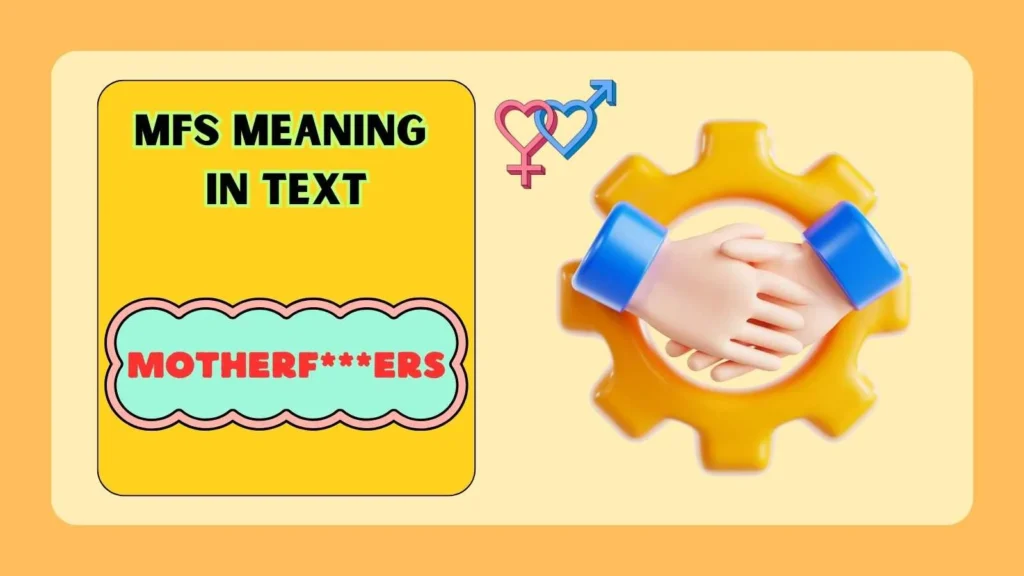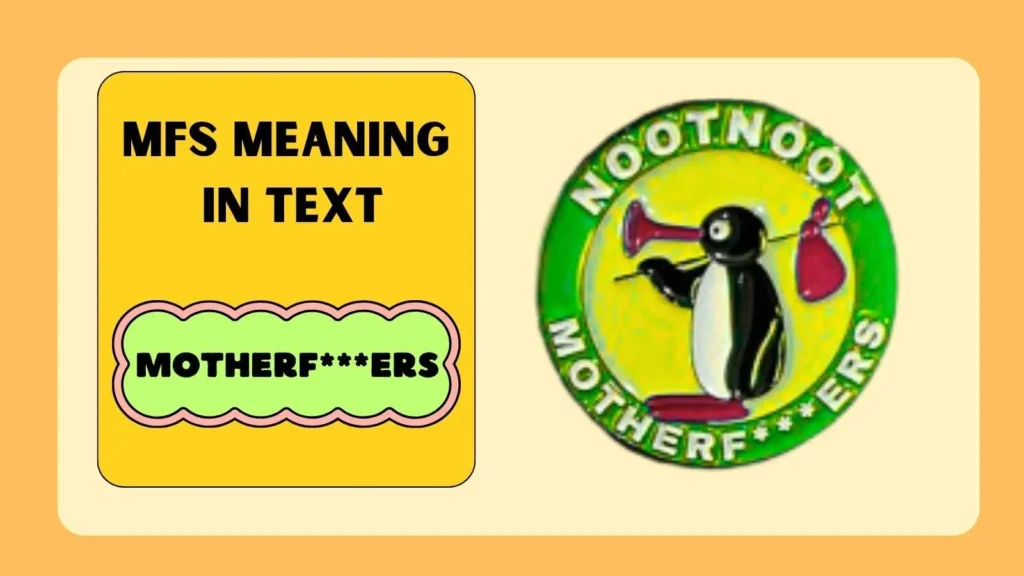Last updated on November 4th, 2025 at 10:28 pm
The internet is packed with acronyms and slang that can leave people scratching their heads. One of the most common yet confusing abbreviations you may encounter is MFS.
If you’ve ever received a message with “mfs” and wondered what it means, you’re not alone. This shorthand appears in casual conversations, memes, and social media comments, making it a trending term worth decoding.
People search for the meaning of MFS in text because it often pops up in group chats, TikTok captions, or Twitter threads where tone and intent aren’t always obvious. Is it funny, rude, or affectionate? The truth depends on the context.
In this guide, we’ll break down its definition, usage, misconceptions, and cultural nuances, so you’ll never be left guessing when you see “mfs” online again.
Definition & Meaning
At its core, MFS is shorthand for “motherf***ers.” While it carries a harsh origin, in modern texting it has evolved. Today, it is often used playfully among friends, similar to calling someone “guys” or “folks.” For example, “These mfs always late” doesn’t necessarily mean anger—it can just mean teasing.
Still, depending on tone and audience, it may come off as offensive. Younger generations tend to use it casually, while older ones may view it as inappropriate.
Background & History
The slang MFS comes from the longer profanity “motherf***ers,” popularized in movies, rap lyrics, and street slang during the late 20th century. Over time, as texting culture shortened words for speed, people abbreviated it into MFS to keep conversations quick.
By the early 2000s, internet forums and instant messaging apps like AIM and MSN spread the abbreviation. With the rise of Twitter and TikTok, “mfs” became a mainstream way of addressing groups with humor, sarcasm, or frustration.
Usage in Various Contexts
The versatility of MFS is what makes it both popular and confusing:
- Casual teasing: “These mfs don’t know how to cook.”
- Frustration: “Mfs always cancel plans last minute.”
- Humor/memes: Used in captions to exaggerate funny situations.
- Storytelling: To emphasize characters in a personal anecdote.
Tone matters most. Among friends, it’s lighthearted. In formal spaces, it can be insulting.
Common Misconceptions & Clarifications
- It’s always offensive: Not true. Many people use it in a joking, non-hostile way.
- It only means one thing: While the root word is clear, intent can range from playful to aggressive.
- Everyone understands it: Not necessarily. Some people outside Gen Z/Millennial circles may misinterpret it.
Similar Terms & Alternatives
If you want the vibe of MFS without profanity, alternatives include:
- Folks
- Guys
- People
- Squad
- Crew
For harsher contexts, words like “idiots” or “jerks” sometimes replace it.
How to Respond to This Term
When someone uses MFS, your response should depend on tone:
- Friendly setting: Match the humor.
- Unsure of intent: Ask for clarification.
- Professional setting: Avoid engaging with slang; reply formally.
Regional or Cultural Differences
In the U.S., MFS is widely recognized in urban slang. In other countries, its meaning may not translate, and some people might find it overly harsh. Contextual awareness is key—what feels normal in an American group chat might feel extreme in another culture.
Comparison with Similar Terms
- MF (singular): Refers to one person instead of a group.
- WTF: Expresses shock but without calling someone out.
- Bruh: Casual, less offensive version of frustration.
Usage in Online Communities & Dating Apps
On TikTok and Twitter, MFS appears in captions to mock funny or relatable situations. Example: “Mfs be like they don’t care, then cry at 3am.”
In dating apps, however, using MFS in a message could come off as disrespectful. It’s best avoided unless both people already use similar slang comfortably.
Hidden or Offensive Meanings
At its root, MFS is a profanity. While softened online, it can still carry negative connotations in sensitive settings. Always consider your audience before using it.
Suitability for Professional Communication
Simply put: MFS is not suitable for professional communication. In workplaces, emails, or business chats, it could appear rude or unprofessional. Stick to respectful wording in professional contexts.
🎬 Mfs Meaning in Reels

- 💬 Mfs = “Motherf*ers”**, but in Reels, it’s usually used humorously or casually.
- 😂 People use “Mfs” to react to funny or shocking clips with a bit of attitude.
- 🎥 It adds drama or sarcasm to captions — making them sound bold and relatable.
- 🧠 On Reels, it helps creators express emotion quickly, especially in meme trends.
- ⚡ Often seen in reaction videos, like “Mfs when they hear…” to exaggerate behavior.
- 📲 The slang makes captions shorter and punchier, perfect for fast-scroll platforms.
- 🌍 It connects with Gen Z humor, which loves irony and strong expressions.
- 🗣️ Even though it sounds harsh, in Reels it’s rarely offensive — just playful.
- ✨ Creators use it to grab attention instantly, boosting engagement.
- 🔥 Overall, “Mfs” keeps Reels fun, expressive, and authentically raw.
💞 Mfs Meaning in Relationships

- ❤️ In relationships, “Mfs” is often used jokingly or teasingly between partners.
- 💬 It can show frustration mixed with affection, like “Mfs still don’t text back 😤.”
- 😅 Some use it to vent about dating struggles in a funny, relatable way.
- 🧠 Context matters — it can mean people, exes, or even friends in relationship talk.
- ⚡ When used playfully, it adds humor to emotional situations.
- 💌 On social media, it helps users describe relationship chaos in a light tone.
- 🎯 It’s also part of Gen Z couples’ communication, mixing slang with sarcasm.
- 😎 Sometimes it’s used to call out behavior like “Mfs act loyal online only 😭.”
- 🥰 Despite its rough sound, it’s not always negative — just dramatic flair.
- 🌹 In short, “Mfs” keeps relationship posts spicy, funny, and relatable.
💬 Mfs Meaning in WhatsApp Chat
- 📱 In WhatsApp chats, “Mfs” is short for ‘motherf*ers’**, used jokingly among friends.
- 😂 It’s often used to express surprise, annoyance, or sarcasm.
- 💡 Common in group chats, it gives conversations a bold, humorous tone.
- 🧠 Users drop “Mfs” when talking about people collectively, e.g., “Mfs really forgot 😭.”
- 🥳 It adds attitude and energy without needing long sentences.
- ⚡ With emojis, it feels less harsh and more playful, especially among close friends.
- 🗣️ Context decides meaning — sometimes it’s funny, sometimes it’s mocking.
- 📲 It helps emphasize emotions quickly, perfect for fast texting.
- 😎 Gen Z uses it as a casual slang staple in everyday WhatsApp convos.
- ✨ Overall, “Mfs” in chats means unfiltered expression with a comic twist.
FAQs
What does MFS mean in text?
It usually stands for “motherf***ers,” used casually or jokingly online.
Is MFS always offensive?
Not always. Among friends it’s playful, but in formal contexts it can be rude.
Can I use MFS in professional messages?
No, it’s considered unprofessional.
Why do people use MFS online?
It adds humor, exaggeration, or emphasis in casual conversations.
Are there clean alternatives to MFS?
Yes—words like “folks,” “guys,” or “people” are safe options.
Does MFS mean the same everywhere?
Mostly yes, but some cultures may find it more offensive than others.
Conclusion
The meaning of MFS in text highlights how slang evolves with time and culture. While rooted in profanity, its modern usage often leans more toward humor and exaggeration than outright offense.
Still, context is everything what feels lighthearted in a meme may sound harsh in another setting. If you want to fit into digital conversations without missteps, knowing when and how to use (or avoid) MFS is essential.
